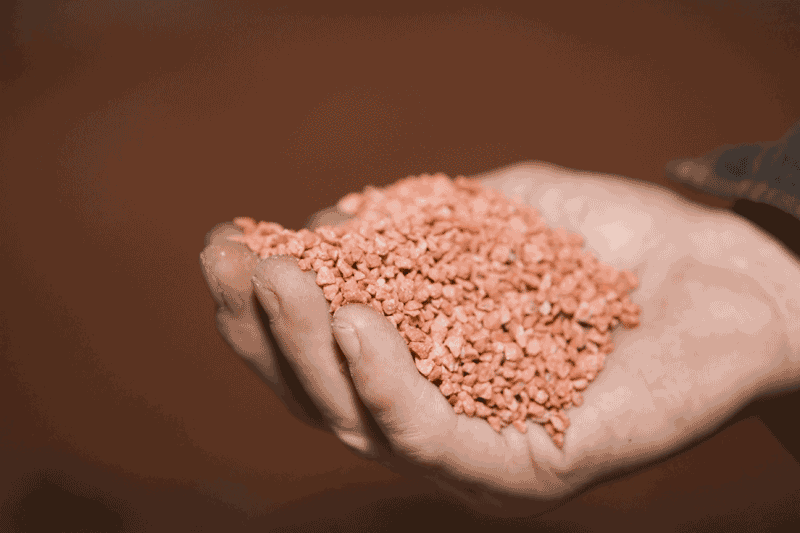The changing potash market
CANADIAN COMPANIES REACT TO BPC COLLAPSE
THOUGH AN OCEAN away, the effects of the collapse of the Belarusian Potash Company have resonated close to home.
PHOTO: POTASH IMPROVES WATER RETENTION, NUTRIENT VALUE AND DISEASE RESISTANCE IN CROPS. IT ALSO HAS NUMEROUS INDUSTRIAL USES.

The Belarusian Potash Company (BPC), a partnership between potash producers OAO Uralkali of Russia and Belaruskali of Belarus came to a halt in July when Uralkali pulled out of the partnership, quoting a failure to break a sales deadlock as the cause.
The Belarus-Russia cartel was established in April 2005 and was responsible for maintaining high potash prices around the world, controlling production as well as the availability of the fertilizer ingredient for sale. Together, Uralkali and Belaruskali mined and marketed about 40% of the world’s potash and sold to the two biggest buyers, China and India. Canpotex Ltd, BPC’s North American counterpart, represented and marketed another 30% of the potash supply.
CANPOTEX
Canpotex is the export agency for potash in Canada, representing Agrium Inc., Mosaic Co., and Potash Corp. Along with BPC, it has controlled 70% of world potash prices, allowing them to keep potash prices artificially high which is ideal for the company and its shareholders, but a burden to farmers.
“Grain Farmers of Ontario in the past has had concern on the issue of this duopoly controlling 70% of the world’s potash and having the effect of higher input prices for farmers for potash,” says Barry Senft, CEO, Grain Farmers of Ontario. “The concerns of shareholders over the loss of these monopolies would indicate that our farmers were likely paying higher prices than they likely would have in a truly free market environment.”
BPC
The dissolution of the BPC was caused by rumours that Belaruskali was selling key fertilizer ingredients outside the partnership, as well as disagreements over sales. Uralkali exited the agreement and proceeded to increase production, likely because they wanted to try and sell more than they were able to through the export cartel, according to Randy Duffy, Research Associate at the University of Guelph. He says higher production results in more supply and lower prices, and lower prices usually lead to increased demand and sales.
Following the breakup, both companies attempted to out produce the other to acquire a larger market share. Chinese buyers recently purchased a large stake in Uralkali, which is operating near the top of its capacity and has reported a four percent production increase following the breakup.
Belaruskali has not been as successful at regrouping — their production is on the decline. India, one of the world’s largest consumers of potash with the fastest growing population in the world has offered to purchase a 20% stake in the company to ensure it has access to a much-needed fertilizer.
INDUSTRY IMPACTS
The breakup of the partnership left Canpotex as the world’s leading potash exporter, and has resulted in the stock prices of its three members to drop. When the breakup was announced, Agrium Inc., Mosaic Co. and Potash Corp. stocks dropped five, 18 and 19 percent respectively. Since the breakup, potash fertilizer prices in Ontario have declined about 10%.
The breakup also leaves major purchasers of the crop nutrient on tenterhooks as they wait to see how low prices will drop before signing contracts — savings that could be passed onto farmers.
“Potash prices have dropped 10% compared to the spring, and down 18% from a year ago according to our Ontario Farm Input Monitoring Project,” says Duffy. “This means lower input costs for farmers. Prices may continue to decrease a bit depending on production and supplies by the major potash producers.”
“Because crop prices have dropped relative to last year this might lead to some decreased fertilizer demand which might put some downward pressure on fertilizer prices as well,” says Duffy.
In early September, analysts predicted a 20% decrease from spring prices, which is equivalent to about $128 per tonne of potash. A survey in October conducted by University of Guelph’s Ridgetown Campus revealed that since June prices have dropped only 10%, or $64 per tonne. This translates into savings of two to three dollars per acre based on applying 50 kilograms of potassium per acre as used in the Grain Corn Conventional Enterprise Budget from the Ontario Ministry of Agriculture and Food.
“Potash production and supply is highly concentrated among a handful of major players,” says Duffy. “They can adjust production to try to control supplies and target certain price levels, which was evident in the increase in fertilizer prices from 2007 to 2009 when crop prices rose. Now that the cartel has broken up, there is more competition for the best price for potash.”
Canpotex’s three primary companies have released third-quarter results and have commented on new developments in the potash industry. According to Agrium’s press release a common focus was market uncertainty and cautious buyer behaviour.
The Mosaic Company’s President and CEO Jim Prokopanko said “economics will ultimately win. Supply and demand fundamentals will bring profitable growth to the industry, as very profitable farm economics and excellent crop nutrient affordability bode well for potash demand.”
Potash Corp attributed its third quarter sales volume decline to a delay in purchases by buyers. Their third quarter production (1.2 million tonnes) was down 27% from the same quarter of 2012.
“The most recent quarter can best be characterized as a predictable response to an unpredicted event,” said Potash Corp President and Chief Executive Officer Bill Doyle through their third quarter report. “As we have seen in the past, fertilizer customers faced with uncertainty act with extreme caution. This was the case during the third quarter, particularly in offshore potash markets, where significant purchases were delayed as Russian producer pronouncements left buyers waiting in anticipation of weaker prices. While this volatility does not change the long-term underlying fundamentals of fertilizer demand, it did significantly slow market activity and our ability to deliver the results we expected.”
UPDATE
Since the January issue of Ontario Grain Farmer went to press, the Canadian potash story has continued to develop. In the wake of significant drops in stock prices, PotashCorp has announced its decision to lay off 1,045 employees, or 18% of its workforce.
PotashCorp’s home province of Saskatchewan will undergo the most job losses with approximately 440 jobs to be cut. Most jobs cut will be in Lanigan, where two mills will suspend production by the end of 2013, and Cory where production will be reduced. Its Saskatoon headquarters will also be impacted.
Saskatchewan Premier Brad Wall voiced his concerns and disappointment in the company’s decision in a letter to PotashCorp Chairman Dallas Howe.
“The interests of shareholders were protected while the interests of employees here in Saskatchewan and elsewhere were sacrificed,” said Premier Wall in the letter. “I am asking you and your board to revisit PotashCorp’s dividend policy and yesterday’s decision, with a view to considering whether the number of layoffs could be mitigated.”
Howe responded to the Premier’s letter quickly, including references to the challenges the potash market is currently facing and the slowing global demand for the mineral, as well as the importance of shareholders to the company.
“Our shareholders provide us with the capital to run and grow our business – enabling the benefits that flow to our employees, communities and other stakeholders. Total elimination of the dividend would have no influence on how many employees it takes to efficiently run our operations,” stated Howe in his response.
According to Howe, share prices have decreased 35% from this year’s high of $45.13. He said that a smaller, more efficient workforce will protect the long-term sustainability of the company and allow for an eventual return to growth.
Canpotex members PotashCorp, Mosaic, and Agrium have all experienced decreases in stock prices since the breakup of the Belarusian Potash Company (BPC) in July. Agrium has stated they are not considering job cuts. •

















